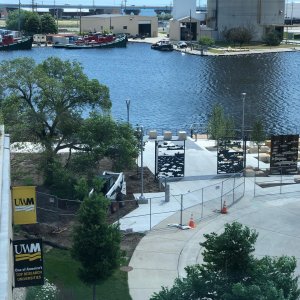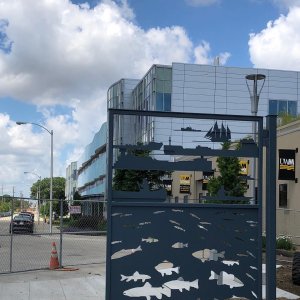Toward a Sustainable Future for Great Lakes Cities
 Erin Keleske – Communities have settled and grown along the Great Lakes for centuries, drawn in by seemingly limitless freshwater and natural resources. But as our cities grew and urbanized, our presence has begun to drastically alter the very characteristics of the region that brought us here in the first place. The vitality of our cities and the health of our watersheds have been in competition.
Erin Keleske – Communities have settled and grown along the Great Lakes for centuries, drawn in by seemingly limitless freshwater and natural resources. But as our cities grew and urbanized, our presence has begun to drastically alter the very characteristics of the region that brought us here in the first place. The vitality of our cities and the health of our watersheds have been in competition.
But there’s a better way– smart city design fosters both a higher quality of life and lower impact on the planet, allowing us to blend human and nature at the water’s edge. At the beginning of August, water experts from around the country converged at the University of Wisconsin– Milwaukee (UWM) School of Freshwater Sciences to begin establishing these linkages at a workshop entitled, “Reimagining Water: Linking Sustainable Urban Water Systems in the Great Lakes Region.”
With support from the Fund for Lake Michigan, organizers Professor James Wasley of the UWM School of Architecture and Urban Planning and Professor Carol Miller of the Wayne State University Healthy and Urban Waters program designed the workshop “to create a shared vision and agenda for collaborative research and actions to sustain the life and livelihoods of Great Lakes waterfront cities and waters.”
The event was a successful showcase of truly interdisciplinary collaboration, bringing scientists, architects, and engineers together with businesses, nonprofits, and government officials.
Professors and researchers from UWM and Wayne State University were joined by colleagues from Marquette, Harvard, the University of Michigan, and other academic institutions to identify the challenges facing the Great Lakes. They posed big questions about the unknowns of novel ecosystems, restoration versus innovation, and the effects of climate change on the drivers of water level variability.
 Architects, and engineers discussed pathways up the “ladder of innovation” and presented potential solutions– green infrastructure and smart city design that catalyze economic growth within the environmental systems we depend on.
Architects, and engineers discussed pathways up the “ladder of innovation” and presented potential solutions– green infrastructure and smart city design that catalyze economic growth within the environmental systems we depend on.
Economic growth has traditionally degraded our environment but, as speaker Patrick Lucey of Aqua-Tex Scientific Consulting, Ltd. said, “the entire planet’s economy is dependent on water.”
As forest fires rage out West and our coasts experience more frequent natural disasters, the Great Lakes region may offer somewhat of a climate refuge to the displaced. The experts brought together by this workshop were in consensus: repairing this dynamic is of increasing importance in the face of oncoming global climate change.
The Reimaging Water Workshop was an imperative first step in creating a Great Lakes community that recognizes our natural and human histories while preparing us for what lies ahead.
